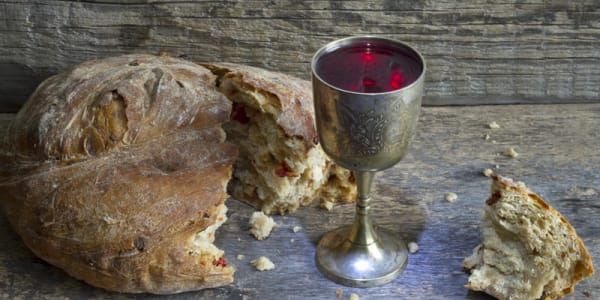Learn more about ActiveChristianity, or explore our theme pages for more
What is the Lord’s Supper, or Communion?
Why do Christians observe Communion? Why is it given so much importance?

The day before He was crucified, Jesus commanded His disciples to continue to observe the Lord’s Supper, or Communion. (Matthew 26:26-30; Mark 14:22-25; Luke 22:14-20.)
Paul expanded on this when he wrote, “For I received from the Lord that which I also delivered to you: that the Lord Jesus on the same night in which He was betrayed took bread; and when He had given thanks, He broke it and said, ‘Take, eat; this is My body which is broken for you; do this in remembrance of Me.’ In the same manner He also took the cup after supper, saying, ‘This cup is the new covenant in My blood. This do, as often as you drink it, in remembrance of Me.’ For as often as you eat this bread and drink this cup, you proclaim the Lord’s death till He comes.
Therefore whoever eats this bread or drinks this cup of the Lord in an unworthy manner will be guilty of the body and blood of the Lord. But let a man examine himself, and so let him eat of the bread and drink of the cup. For he who eats and drinks in an unworthy manner eats and drinks judgment to himself, not discerning the Lord’s body.” 1 Corinthians 11:23-29.
The Lord’s Supper: Remembrance of Jesus
The Lord’s Supper is a testimony. By partaking of it, I testify that Jesus’ body was broken for me and that He shed His blood for me. I thereby proclaim the death of Christ. We are to do this in remembrance of Him. When I break the bread, I remember how His body was broken for me. When I drink of the cup, I remember that He shed His blood for my sake for the forgiveness of sins. I testify at the same time that I have also received this gift, or this grace. I do not partake of it in order to receive forgiveness for my sins, but because I have received the forgiveness of sins.
Like what you’re reading?
Eating and drinking unworthily
God will not forgive me my trespasses if I do not forgive others their trespasses. (Matthew 6:15.) “But let a man examine himself, and so let him eat of that bread and drink of that cup.” 1 Corinthians 11:28. I am not worthy to receive forgiveness if there is someone I cannot forgive. I testify against myself if I then drink of the cup. I pass sentence on myself.
We are to walk in fear throughout the time of our sojourn because we have been redeemed from our aimless conduct by the precious blood of Christ. (1 Peter 1:17-19.) Every person must examine himself whether he hates all aimless conduct; then he may break the bread and drink of the cup. I eat and drink unworthily if there is a fault in my life which I love and do not want to let go. He has given His blood to redeem me. I am judged, and I sin against the body and the blood of the Lord if I want to hold on to my fault.
Communion: One body
“The cup of blessing which we bless, is it not the communion of the blood of Christ? The bread which we break, is it not the communion of the body of Christ? For we, though many, are one bread and one body; for we all partake of that one bread.” 1 Corinthians 10:16-17. All those who break the bread testify that they do not serve themselves, but each other. By breaking the bread, I testify that I do not live for myself, but for the others, and that I am willing to accept all the help for salvation they can give me because we all eat of the same bread. Let each one examine himself, and then break the bread.
Because Jesus laid down His life for us, we also ought to lay down our lives for each other. (1 John 3:16.) When I eat and drink, I too proclaim that I ought to lay down my life for those who truly eat of the same bread, because we proclaim the death of the Lord. When I proclaim His death, I also proclaim that I died with Him that I might no longer live for myself, but for Him who died for me and rose again. (2 Corinthians 5:15.)
Just as a member supplies the other members with all the strength and nourishment he draws from the body, so we too are to supply the other members with all the love, wisdom, strength, grace, mercy, patience, and faithfulness that we receive from Christ. If we are not willing to love, neither are we worthy to receive love. (1 John 4:11.) If we are unwilling to be merciful, forgiving, easy to get along with, helpful, or forbearing, then we are also unworthy to receive these blessings.
Let each one examine himself when he comes to the Lord’s Supper, and so eat of the bread and drink of the cup.
This article has been translated from Norwegian, and is an edited version of an article first published in BCC’s periodical “Skjulte Skatter” (“Hidden Treasures”) January 1933, with the title “The Lord’s Supper.”
© Copyright Stiftelsen Skjulte Skatters Forlag
Scripture taken from the New King James Version®, unless otherwise specified. Copyright © 1982 by Thomas Nelson. Used by permission. All rights reserved.



